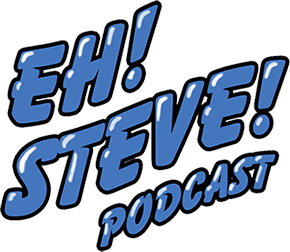The Square Enix I Try Hard to Love
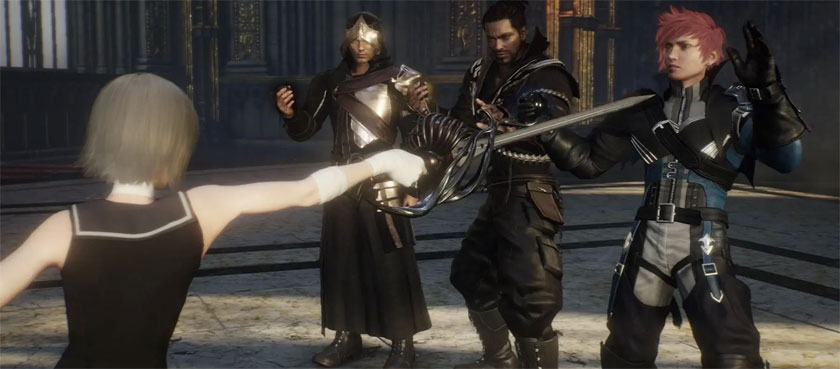
From a layman’s perspective, it makes little business sense to release your game anywhere close to February 25th, 2022. While some titles such as Horizon: Forbidden West are big enough themselves to sell regardless, most other titles are doomed to loom in the shadow of Elden Ring. It has been over two weeks and only now are players starting to lose some degree of steam from what has become one of the largest launches of the industry. The game was not only incredibly well hyped, it actually managed to deliver in comparison to recent disappointments such as Cyberpunk 2077.
So why did Square Enix release a demo for Babylon’s Fall, a game already struggling to find an audience, on the same day that Elden Ring released? Why did Babylon’s Fall release a week after while their “Souls-like” reimagining of the original Final Fantasy, Stranger of Paradise: Final Fantasy Origin, is launching three weeks after and bound for comparison? In fact, why is Square Enix releasing four different games clustered together throughout March, all competing for audience attention and retention?
The answer most likely resides in Square Enix’s fiscal year concluding in March. As I am no investor nor business man, I can only speculate that Square Enix is releasing these titles all within the March window in order to meet some form of sales expectations or promise to investors. Would it have been better to delay some of these games out further? It once more seems that way from a layman’s perspective. Now that Forspoken has been delayed to the Autumn, its original release slot in May could be better filled by Stranger of Paradise. Games such as Triangle Strategy and Chocobo GP seem to be targeting different demographics than Elden Ring, but if From Software’s latest adventure is truly hitting Red Dead Redemption 2 numbers, then it is clearly appealing to quite the broad audience of players. Even fans of tactical RPG’s may find it difficult to slot time in for Triangle Strategy as they scour the lands between. As for Babylon’s Fall, it is doubtful that a better release window would have saved it, though it may have at least done a tad better than its current peak numbers.
I’m not writing this to speculate on Square Enix’s reasoning for such a condensed set of game launches, however. I am instead writing this because I’ve played demos of three of their four releases, and can only shake my head and groan at the news coming out of the fourth. In some ways, I think the media is being unfair. In other cases, the looming presence of Elden Ring has deterred me from what might otherwise be a somewhat risk-taking purchase. Instead, I want to take a moment to look at these titles, recent reveals, and additional business decisions that the company has been making lately.
Rather than start with one of the games, I’d like to first highlight the Square Enix Music Channel that just opened last week on YouTube. While there are only a few videos on the channel itself, it compiles entire series soundtracks, both obscure and high profile, into easy to find playlists. Rather than fight the myriad number of users uploading music tracks onto YouTube, Square Enix has gone in and created an official one-stop shop for very same music, allowing them to snag ad money in the process. They’ve even uploaded the above Lo-Fi mix that is the current soundtrack to the writing of this post.
This is a smart move by Square Enix because it allows them to profit off of how their audience engages with YouTube for music, while simultaneously looking like a generous gesture towards the fans. Look at all of these classic and recent soundtracks made available for free! It seems especially in tune with the modern audience in comparison to Nintendo, who recently put out a huge copyright strike on one of the largest soundtrack uploaders on the platform. It should be noted I am not commenting on whether the copyright strikes are or are not justified. However, Square Enix’s new channel has the potential to earn the good will of their fanbase and could set a positive precedent for similar companies with legacy soundtracks fans delight in listening to.
Which is why the seemingly desperate greed presented by a game like Chocobo GP seems so bizarre. A child-friendly cart racer and successor to a niche PlayStation original favorite, Square Enix had cynically stuffed the ol’ bird with microtransactions and premium currency. It was designed like a mobile game rather than a $50 retail package, though this is perhaps in part due to the digital-only “Lite” version of the title. You’d think stripping features from the Lite variant would be enough to encourage players to spend cash on the full version, but instead they try and coax microtransactions out of their players.

What’s more is the game is filled with bugs that impact the player’s ability to fairly race online. While Square Enix has already promised some bug fixes and changes, this is still a pretty bad look when you’re not only competing with the microtransaction free Mario Kart 8 Deluxe, but are now overshadowed by Nintendo’s forty-eight new tracks costing half the price of a “full”, microtransaction laden release.
Nintendo may look like the bad guy in terms of making their game soundtracks readily available for purchase or listening, but their flagship cart racer is far, far more customer conscious. The idea of gradual DLC and content down the line is not a bad thing, but adopting mobile phone strategies to try and manipulate your players into spending cash or grinding races out is the wrong way to go about it.
Oddly enough, however, it is Babylon’s Fall that has become the games media punching bag. As seen in the above link regarding the game’s peak player count, pundit and professional leaker and rumor monger Jeff Grub went so far as to say the game made the worst first impression of a full-priced, $60 game he’s ever played. This seemed unusual to me, as playing the demo for Babylon’s Fall seemed no more or less offensive than time spent in Destiny 2. Maybe Bungie gets a free pass due to offering some of its experience up for free, but it is also embroiled in its own controversy as the company continues to take paid expansion content offline to make room for new expansion content, all of which requires money to purchase and could still be pulled offline some day. If Destiny 2 has anything that Babylon’s Fall does not, it is top-of-the-line gameplay.
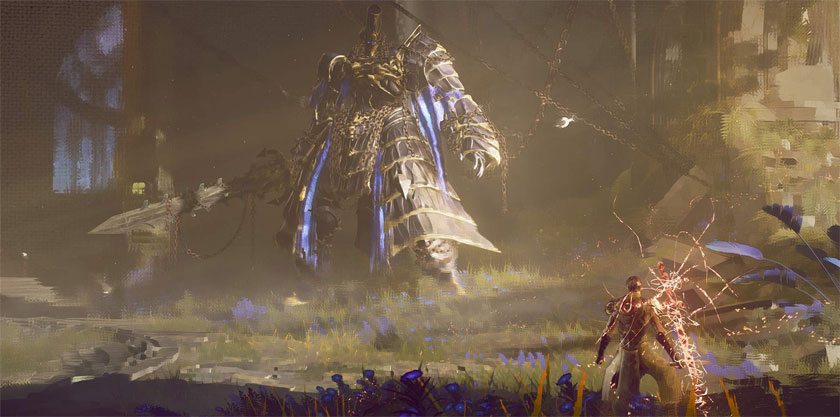
This, perhaps, is the truly lamentable aspect of Square Enix’s efforts to have PlatinumGames make a live-service title. Contrary to what some press have been claiming, Babylon’s Fall is not the worst title Platinum has ever made; that credit goes to either The Legend of Korra or Teenage Mutant Ninja Turtles: Mutants in Manhattan. At the same time, there is definitely something of Platinum’s signature style that feels missing from Babylon’s Fall, and it certainly impacts how good the gameplay feels.
Perhaps it is simply lacking the mobility that most Platinum titles are known for. Even Vanquish, a third-person shooter with cover-based mechanics, is best experienced by dashing, sliding, and leaping across the battlefield. In contrast, the characters in Babylon’s Fall feel slow with a barely perceptible dodge animation. There also seems to be no “dodge cancel”, a horrendous crime given how little wind-up the mob of foes have for most of their attacks. Perhaps the worst crime is the overall effectiveness of button-mashing. Why memorize combos when it is just as, or more, fruitful to let your fingers asynchronously jab at whatever attack buttons are on the controller?
Keep in mind I only played up towards the first major, raid-style boss, which is where I had expected the demo to end. If Square Enix has learned to do anything properly, it is in providing substantial demo packages that often transfer save progress to a full purchase of the game. If I had so desired, I could continue to play Babylon’s Fall until I truly ran out of content. However, it was the first boss that convinced me this is a game I am unlikely to purchase. Even if it goes on deep discount, it is designed with multiple players in mind, and I had been playing the demo as a solitary experience. This turns most of the opponents into damage sponges, but most significantly, that major, raid-style boss has an attack that cannot be stopped if you’re flying solo. This means you must either play with randoms – something I am certainly averse to doing – or you play with friends. Even with a free demo available, I have few friends interested in giving this game a try.
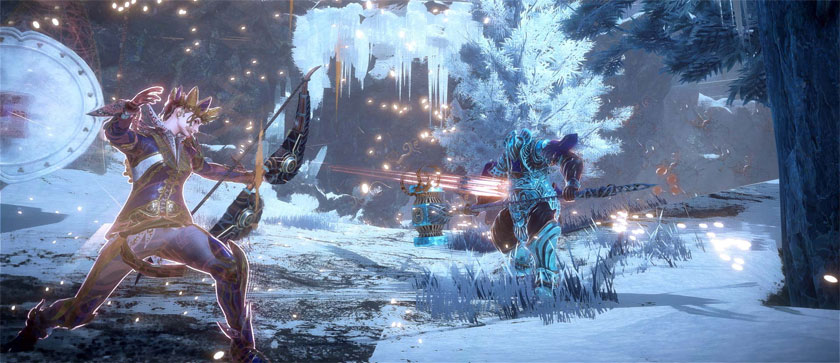
As of this writing, Square Enix has put out a feedback survey for improving Babylon’s Fall. Unfortunately, the survey is far too preoccupied with the game’s graphics and visual fidelity rather than the mechanics or weakness of a live-service model. Babylon’s Fall is the third desperate attempt by Square Enix to launch a Games-as-Service title, with Outriders being the closest to success. I don’t begrudge large publishers in the industry trying to score their own live-service money generator, but this is also the company that’s been putting out the highly successful Final Fantasy XIV. It’s not like live-service and MMO’s are that different from one another, and the blueprints for creating a service that respects and commands loyalty from its consumer base are already present within their portfolio. It’s so bizarre to watch them crash-and-burn three years in a row, all because they tried to rush several products out the door rather than experiment with just one single title.
I’d also be lying if I claimed that I wasn’t curious to see if someone could make a melee-action live-service title that took inspiration from Final Fantasy XIV much like Destiny has famously taken cues from World of Warcraft. I think it would be quite fascinating to see how the model could evolve, especially as there’s just some evenings you want a title with a simple treadmill to log into and make some progress in. Unfortunately, Babylon’s Fall is not that game for me.
Oddly enough, Stranger of Paradise: Final Fantasy Origin makes for a comparatively decent case for a co-op action adventure with constant loot drops. The very premise continues to hurt my brain as I weep for the “Souls-like based on the original Final Fantasy” envisioned in my head by its rumored announcement. More closely resembling Elden Ring, that take on the original, D&D-inspired grandfather of the franchise could have been better than the product we’ve received. But “if wishes were horses” is a saying for a reason, and if I had my wishes, Tetsuya Nomura and Kazushige Nojima would be restrained and confined to only working on original properties rather than corrupting pre-existing ones. I am convinced they are two of the most overrated and over-rewarded creatives to ever work at Square Enix, but at least Team Ninja is around to save this game’s story from itself with solid mechanics.
Or so I would like to hope. Unfortunately, Stranger of Paradise is a stark contrast to the lack of tutorials present in Elden Ring, revealing that the latter’s obtuse nature is possible in part due to its overall simplicity. Stranger of Paradise immediately throws a series of complex combat controls at the player, with the star of the show being two different types of blocking and the different features they possess. In the end, it feels like the game could have managed most of these ideas with a single block button, perhaps focused more on parry timings than opting for one block function over another, separate block function.
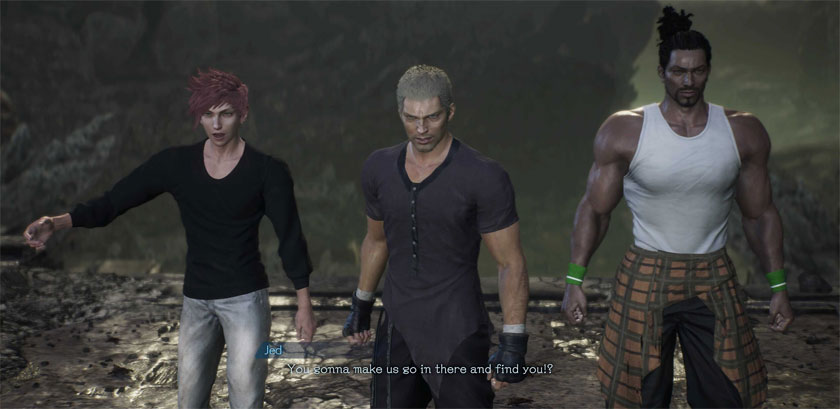
It’s not really the lack of simplicity that’s the problem, though. Once you’re up against Garland, for example, it feels like the game is starting to really shine. If you master the blocks and evasion, whittling down Garland’s own stagger gauge until you can sock him in the face, then you find yourself confident and satisfied. Yeah, you figured out how to approach the game! You trashed that boss! Let’s see what’s next!
What’s next is an optional side-mission featuring multiple foes and a whole lot of… well, a whole lot of chaos. The player in particular seems to draw the majority of the aggro, even while hanging back trying to better position themselves for a heal or to cast a spell. Combine that random aggro draw with a limited periphery and multiple opponents with powerful ranged attacks, and the player is bound to suffer greatly for… well, for trying to understand what the heck is even going on, for one.
If there is anything a game seeking the difficulty of From Software’s franchises should take to heart, it’s the ability to kite foes and isolate them. You know what Stranger of Paradise has that From Software games don’t, however? Difficulty levels, and I have a feeling many will be knocking this one down to Story or even Casual difficulties.
I, in the meantime, do not plan to get it upon release, and don’t even know if I’d get it on sale. Once more, this is a title that suffers due to how closely it releases to Elden Ring and therefore invites comparison. What is more shocking is that this is the same team that worked on Nioh, and while I had lost patience with that title, it certainly felt more carefully designed than Stranger of Paradise has felt. Combined with the end result that is Babylon’s Fall, it really is enough to wonder if Square Enix knows how to leverage their outsourced studios, as both PlatinumGames and Team Ninja can do far, far better than this.
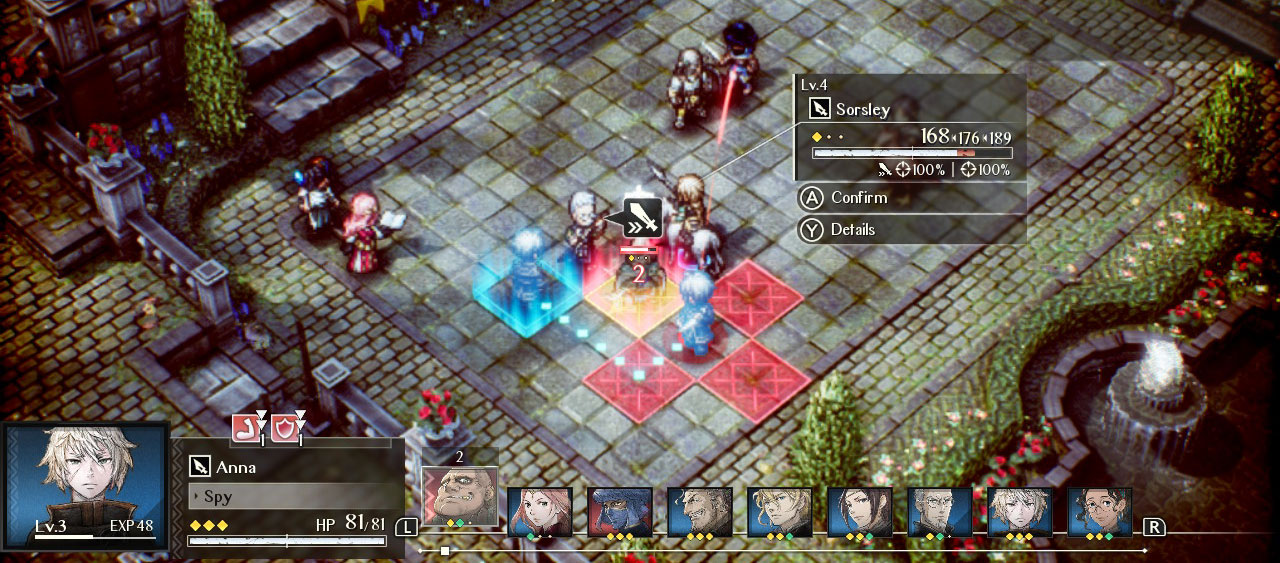
Which leaves one final demo that I managed to play: Triangle Strategy. I played the first chapter of the game and was convinced it deserves my full and immediate purchase. True, one single battle at the game’s start is not properly indicative of the full experience, but it felt properly balanced to provide a tough enough challenge to get me thinking about my tactical decisions. It felt good to play, and I had few qualms with it.
Which is why I find Square Enix so strange. Babylon’s Fall and Chocobo GP are cynical models of modern AAA game development, and while Stranger of Paradise is not nearly so greedy, it is a worthless bastardization to the singular title that saved the Square half of the company. Not to say that the original’s time-traveling nonsense of a narrative were anything to write home about, but at this point it feels as if Tetsuya Nomura absolutely loathes anything that remotely resembles the fantasy genre. The man’s sense of cool feels perpetually trapped in middle-school, and Kazushige Nojima’s inability to convey Jack’s single-minded obsession with any subtlety is… well, it’s a perfect fit with Nomura’s sense of cool, I’ll give it that.
Perhaps, most of all, Stranger of Paradise is indicative of Square Enix’s seeming aversion to turn-based combat. While some titles, such as Dragon Quest XI and Octopath Traveler, are bastions of old-fashioned turn-based RPG combat, upcoming titles like Valkyrie Elysium abandon their more turn-based, traditional roots in favor of a copy-paste action-RPG build that could have come from any mid-to-low-budget developer of Japan. While Triangle Strategy is a love-letter to Yasumi Matsuno works such as Tactics Ogre and Final Fantasy Tactics, it seems even The DioField Chronicle must move somewhat towards real-time action. It at least remains tactical, however.
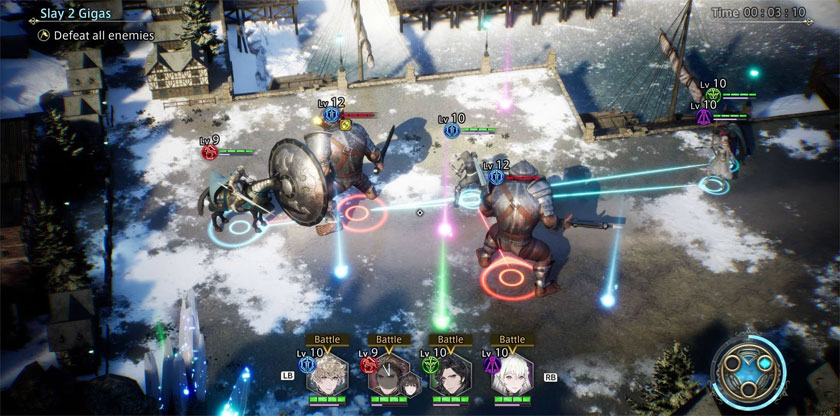
Ultimately, Triangle Strategy is why I cannot hate Square Enix. They’ve almost completely botched their management of Eidos, and while I greatly enjoyed the reboot of Tomb Raider and its sequel, it took until Marvel’s Guardians of the Galaxy for them to put out a game that feels like everything Western AAA development could be. They’re still taking risks and green-lighting titles that aren’t guaranteed to develop a massive following, and Final Fantasy XIV managed to dethrone World of Warcraft in the perception of the gaming community through sheer force of being good.
Yet they then turn around and stuff Chocobo GP, of all games, with mobile phone microtransaction garbage, ask their audience if improving the graphics of Babylon’s Fall will make them more likely to recommend it, and introduce an action-oriented spin-off to a turn-based franchise fans have long been awaiting a proper sequel to.
Honestly, I was going to be more fair to Square Enix when I started writing this, but I find it a bit difficult now. Their decisions just seem absolutely bizarre to me. Every so often they release a game or trailer that reminds me why I’m still following them and look forward to their digital presentations, but then… well, then they have E3 2021, a presentation that pleased almost no one and were ratio’ed hard on YouTube. Y’know, back when you could see the number of dislikes a video had.
What a bizarre company to try and like.


